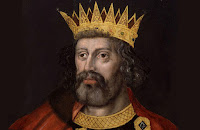His tutor was Sir Guy Ferre, who gave him a keen interest in horses, both riding and breeding. He also enjoyed hunting, and one of the first books on hunting, The Art of Venerye, was written by Edward's royal huntsman.
Edward's household had books in French and Latin, but we can't be certain he read and wrote those languages. He would have been raised speaking French, and for his coronation he chose to take the oath in French, although a Latin version was available.
He also took a great interest in music, and was a patron of musicians and entertainers during his reign. He enjoyed the Welsh crwth, a proto-violin, and as king sent one of his people, Richard the Rhymer, to learn how to play it. Contemporary authorities did not approve of his love of buffoonery, and Edward's later appointment of Walter Reynolds as an archbishop is said to be due to Reynolds' skill as an actor.
His youth, like that of his father, made some observers question whether he would make a good king. Also, like his father, he went through a period when he took sides in a problem, causing the king to refuse to speak to his son and heir. That dispute, and why King Edward was "forced" to start speaking to his son again, will be explained tomorrow.


